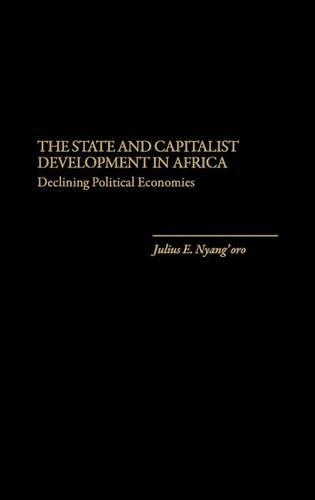
The State and Capitalist Development in Africa: Declining Political Economies
(Hardback)
Publishing Details
The State and Capitalist Development in Africa: Declining Political Economies
By (Author) Julius E. Nyang'oro
Bloomsbury Publishing PLC
Praeger Publishers Inc
21st July 1989
United States
Classifications
Tertiary Education
Non Fiction
Political economy
338.96
Physical Properties
Hardback
189
Description
This work goes beyond recent analyses of African development to present a post-dependency framework for the study of Africa's political economy. The author argues that, although the contributions of the modernization and dependency frameworks cannot be ignored, recent economic and political adjustments and realignments require a more penetrating analysis--one that takes into account such factors as the overall growth of the economy, the role of the state, parallel markets, and capitalist development in general. An ideal supplemental text for courses in comparative politics, international political economy, and African development, the volume is comparative in approach and covers the countries of sub-Saharan Africa. The author begins by discussing the various dimensions--agricultural, environmental, industrial, population--of Africa's continuing crisis condition. He then closely examines the African development experience since independence and explores the evolution of development theory and its application to Africa. Arguing for a new mode of production approach to the study of Africa's political economy, the author attempts to determine whether Africa is indeed predominantly capitalist and raises questions regarding prevailing theories of capitalist development. Finally, Nyang'oro looks at the state in Africa, pointing to some fundamental weaknesses that contribute to the ongoing crisis and offering a perceptive assessment of development options open to Africa.
Reviews
. . . This volume is a stimulating supplemental text for courses in African politics and economics. . . .-Perspectives on Political Science
Nyang'oro attempts to provide a theoretical alternative to the dependency and the modernization theories as the basis for explaining the historical development of African economies. Chapter 1 provides an excellent review of Africa's current economic crisis. Then the author thoroughly analyzes dependency and modernization theories as they relate to Africa and rejects them as being inadequate to explain the African case. Similarly, after review of the production and exchange process in Africa, he concludes that African states are not predominantly capitalistic. Believing that African's development experience can be analyzed only by looking at the state as an actor in the economic and political spheres, the author examines in depth the historical role of the state in African economies and attributes Africa's development failures largely to the inability of the state to encourage and promote capitalistic development and to the extensive role the state plays in the political economy. He is on target in concluding that "unless a fundamental restructuring of Africa's political economy is undertaken, no amount of foreign aid and political tinkering" will save Africa. However, this reviewer takes issue with the quickness and ease with which the author dismisses the relevance of both the dependency and modernization theories, finding unconvincing his analysis of the state as an "actor" in explaining Africa's current economic crisis. Nevertheless, Nyang'oro offers excellent research and documentation in this well-written and organized volume. Strongly recommended for reference and source materials to upper-division undergraduate and graduate students.-Choice
The work sees the African condition as a crisis in the areas of agricultural, environmental, industrial, and population problems. It looks at the development experiences of weak political governments unable to coordinate economic plans effectively.-Booknotes
." . . This volume is a stimulating supplemental text for courses in African politics and economics. . . ."-Perspectives on Political Science
"The work sees the African condition as a crisis in the areas of agricultural, environmental, industrial, and population problems. It looks at the development experiences of weak political governments unable to coordinate economic plans effectively."-Booknotes
"Nyang'oro attempts to provide a theoretical alternative to the dependency and the modernization theories as the basis for explaining the historical development of African economies. Chapter 1 provides an excellent review of Africa's current economic crisis. Then the author thoroughly analyzes dependency and modernization theories as they relate to Africa and rejects them as being inadequate to explain the African case. Similarly, after review of the production and exchange process in Africa, he concludes that African states are not predominantly capitalistic. Believing that African's development experience can be analyzed only by looking at the state as an actor in the economic and political spheres, the author examines in depth the historical role of the state in African economies and attributes Africa's development failures largely to the inability of the state to encourage and promote capitalistic development and to the extensive role the state plays in the political economy. He is on target in concluding that "unless a fundamental restructuring of Africa's political economy is undertaken, no amount of foreign aid and political tinkering" will save Africa. However, this reviewer takes issue with the quickness and ease with which the author dismisses the relevance of both the dependency and modernization theories, finding unconvincing his analysis of the state as an "actor" in explaining Africa's current economic crisis. Nevertheless, Nyang'oro offers excellent research and documentation in this well-written and organized volume. Strongly recommended for reference and source materials to upper-division undergraduate and graduate students."-Choice
Author Bio
JULIUS E. NYANG'ORO is Visiting Assistant Professor of African Studies at the University of North Carolina at Chapel Hill. His articles have appeared in journals such as African Political Science, Studies in Comparative International Development, and TransAfrica Forum.
